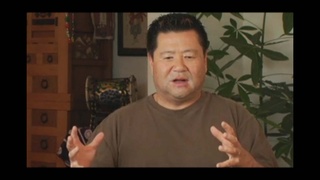Interviews
Witnessing the atomic bombing of Hiroshima
And it was soon after that that Hiroshima was bombed. And, but that was the time that we didn't know what it was. But it was the most beautiful -- in the morning; it was the most beautiful orangey, pinkie, red. I mean, there was... I don't know what you call it. The whole sight was beautiful. Only to hear that it was a atomic bomb, all the buildings burning. Now we didn't see the cloud, but it was the skyline that was all red. But it was after you... hearing what had happened, it makes you choke to think that... and we didn't have any relatives living in Hiroshima so it didn't touch you to that degree, but however, the enormity of it all, we didn't know.
Date: August 3 & 4, 2003
Location: Washington, US
Interviewer: Alice Ito
Contributed by: Denshō: The Japanese American Legacy Project.





